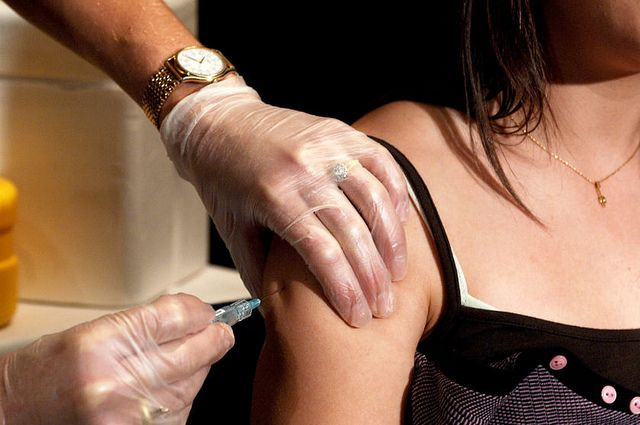Experimental Cervical Cancer Vaccine Kills Human Papillomavirus (HPV)

A new vaccine has been shown to be effective in treating women who are already infected with the human papillomavirus (HPV). According to estimates by the Centers for Disease Control and Prevention, about 11,967 new cases of HPV-associated cervical cancer are diagnosed in the United States each year.
The new type of vaccine helps the body get rid of two strains of HPV that have been linked to cervical cancer.
The vaccine, developed by Inovio Pharmaceuticals Inc., is designed in such a way that it inserts a piece of DNA into the patient's cells. This piece of DNA then promotes the production of a specific protein that in turn prompts the cells of the immune system to attack cells that have been infected with HPV, HealthDay reported.
The vaccine enables the immune system to make large quantities of T-cells that can target cancer-causing genes known as E6 and E7 oncogenes, Reuters Health reports.
"Today's milestone is convincing evidence that a DNA-based immune therapy can generate potent and durable T-cell responses in people. Our ongoing phase II efficacy trial is designed to show that the immune responses seen in this study, in particular the generation of killer T-cell responses, may reverse cervical disease caused by chronic HPV infection," said Dr. J. Joseph Kim, Inovio's President and CEO in a statement.
Inovio Pharmaceuticals said that the vaccine called "VGX-3100" was tested on 18 women in a phase I dose-escalating trial. The vaccine was given over a period of three months. The vaccines given to the participants differed in the doses and each was given a mild electric shock along with the vaccine.
The vaccine was able to increase the immune response and this increase resulted in the elimination of cells infected with the virus, researchers said.
"The type of T-cell killing activity seen in this new data provides a growing foundation for efficacy trials focused on the treatment of HPV-associated cancers including cervical, head and neck, and anogenital cancers," Dr. Kim added.
The new vaccine differs from Merck's Gardasil and GlaxoSmithKline's Cervarix vaccine because it can help get rid of the virus after it has infected a person. The vaccines that are currently used can only prevent the virus from infecting the body.
The study was published in Science Translational Medicine.
Published by Medicaldaily.com



























